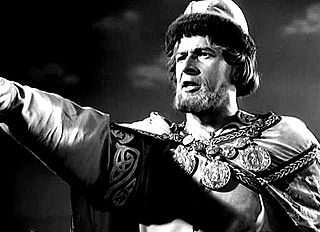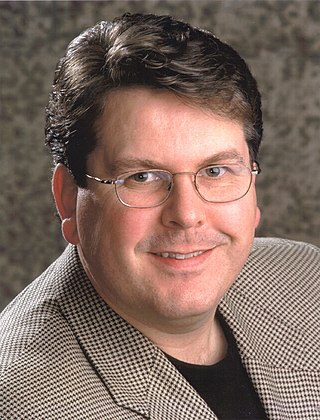Flourish, Mighty Land, Op. 114, (variably called Flourish, Mighty Homeland or Prosper, Mighty Country) is a cantata written by Sergei Prokofiev in 1947, to commemorate the 30th anniversary of the October Revolution, along with his Thirty Years.
Flourish, Mighty Land, Op. 114, (variably called Flourish, Mighty Homeland or Prosper, Mighty Country) is a cantata written by Sergei Prokofiev in 1947, to commemorate the 30th anniversary of the October Revolution, along with his Thirty Years.
In contrast to the monumental Cantata for the 20th Anniversary of the October Revolution , this cantata, in one movement, lasts 8 minutes. It is scored for chorus and orchestra.
The cantata opens with a trumpet theme in D-flat major, which is subsequently treated to Prokofiev's typical harmonic modulations. After a repeat of the theme by muted trumpet and piccolo, strings and woodwinds develop it.
The chorus then introduce a glowing theme a cappella, which alternates with pure orchestral sections. The climax is reached half-way, when the chorus and the orchestra perform together.
The chorus repeats the a cappella sections again, this time interrupted by marching orchestral chords. The chorus then fades out, and the opening trumpet theme returns. The cantata ends with three notes in descending tritones (high D-flat, G, low D-flat).
12 November 1947, Moscow: Nikolai Anosov (conductor), USSR State Symphony Orchestra, Russian Federal SSR Choir.
| Orchestra | Choir | Conductor | Record Company | Year of Recording | Format |
|---|---|---|---|---|---|
| State Symphony Capella of Russia | State Symphony Capella of Russia | Valeri Polyansky | Chandos Records | 2003 | CD |
| New Philharmonic Orchestra | St Petersburg Philharmonic Choir | Alexander Titov | Beaux | 1998 | CD |
| USSR Ministry of Culture State Symphony Orchestra | USSR Ministry of Culture Chamber Choir | Gennadi Rozhdestvensky | Melodiya | ? | LP |
The Pomp and Circumstance Marches, Op. 39, are a series of five marches for orchestra composed by Sir Edward Elgar. The first four were published between 1901 and 1907, when Elgar was in his forties; the fifth was published in 1930, a few years before his death; and a sixth, compiled posthumously from sketches, was published in 1956 and in 2005–2006. They include some of Elgar's best-known compositions.

Sergei Prokofiev wrote his Symphony No. 3 in C minor, Op. 44, in 1928.

Sergei Prokofiev's Symphony No. 4 is actually two works, both using material created for The Prodigal Son ballet. The first, Op. 47, was completed in 1930 and premiered that November; it lasts about 22 minutes. The second, Op. 112, is too different to be termed a "revision"; made in 1947, it is about 37 minutes long, differs stylistically from the earlier work, reflecting a new context, and differs formally as well in its grander instrumentation. Accordingly there are two discussions.
The Young Person's Guide to the Orchestra, Op. 34, is a 1945 musical composition by Benjamin Britten with a subtitle Variations and Fugue on a Theme of Purcell. It was based on the second movement, "Rondeau", of the Abdelazer suite. It was originally commissioned for the British educational documentary film called Instruments of the Orchestra released on 29 November 1946, directed by Muir Mathieson and featuring the London Symphony Orchestra conducted by Malcolm Sargent; Sargent also conducted the concert première on 15 October 1946 with the Liverpool Philharmonic in the Philharmonic Hall, Liverpool, England.

Alexander Nevsky is the score composed by Sergei Prokofiev for Sergei Eisenstein's 1938 film Alexander Nevsky. The subject of the film is the 13th century incursion of the knights of the Livonian Order into the territory of the Novgorod Republic, their capture of the city of Pskov, the summoning of Prince Alexander Nevsky to the defense of Rus', and his subsequent victory over the crusaders in 1242. The majority of the score's song texts were written by the poet Vladimir Lugovskoy.
Ivan the Terrible, Op. 116, is the score composed by Sergei Prokofiev for Sergei Eisenstein's film Ivan the Terrible (1942–45) and its sequel (1946), the first two parts of an incomplete trilogy. The project was Prokofiev's second collaboration with Eisenstein, the first being the popular Alexander Nevsky (1938). The majority of the non-liturgical song texts were written by Vladimir Lugovskoy, who collaborated with Prokofiev on the texts for Alexander Nevsky.
Sergei Prokofiev's Symphony No. 7 in C-sharp minor, Op. 131, was completed in 1952, the year before his death. It is his last symphony.
The Abnuceals Emuukha Electric Symphony Orchestra was a group of Hollywood session musicians organized by Frank Zappa in 1967 to record music for his first solo album Lumpy Gravy. Some of these musicians are thought to have worked together in various combinations under the leadership of Ken Shroyer as far back as 1959. However, it was Zappa who gave them the name several years later.
Factory: machine-music, Op. 19, commonly referred to as the Iron Foundry, is the most well-known work by Soviet composer Alexander Mosolov and a prime example of Soviet futurist music. It was composed between 1926 and 1927 as the first movement of the ballet suite Stal ("Steel"). The remaining movements of Steel, "In Prison," "At the Ball," and "On the Square" have been lost, and Iron Foundry is performed today as a standalone orchestral episode.
Zdravitsa, Op. 85, is a cantata written by Sergei Prokofiev in 1939 to celebrate Stalin's 60th birthday. Its title is sometimes translated as Hail to Stalin in English. A performance lasts around thirteen minutes.
The Bachianas Brasileiras are a series of seven suites by the Brazilian composer Heitor Villa-Lobos, written for various combinations of instruments and voices between 1930 and 1945. They represent a fusion of Brazilian folk and popular music on the one hand and the style of Johann Sebastian Bach on the other, as an attempt to freely adapt a number of Baroque harmonic and contrapuntal procedures to Brazilian music. Most of the movements in each suite have two titles: one "Bachian", the other Brazilian.

Allan Gilliland is a contemporary Canadian composer.

Slava! A Political Overture for Orchestra is a short orchestral composition by Leonard Bernstein. It was written for the inaugural concerts of Mstislav Rostropovich's first season with the National Symphony Orchestra in 1977. It premiered on October 11, 1977, with Rostropovich conducting.

Serenada Schizophrana is a suite of six symphonic movements written by American film composer Danny Elfman in 2004. It was commissioned by the American Composers Orchestra, which premiered the work at Carnegie Hall in New York City on February 23, 2005, conducted by Stephen Sloane. A studio recording was released on October 3, 2006, with John Mauceri conducting the Hollywood Studio Symphony orchestra. Album art was done by George Condo.

The trumpet repertoire consists of solo literature and orchestral or, more commonly, band parts written for the trumpet. Tracings its origins to 1500 BC, the trumpet is a musical instrument with the highest register in the brass family.
Paul Angerer was an Austrian violist, conductor, composer and radio presenter.

The Cantata for the 20th Anniversary of the October Revolution, Op. 74, is a dramatic cantata by Sergei Prokofiev.
Juraj Filas was a Slovak composer. His work included more than 100 compositions: symphonies, cantatas, numerous compositions for chamber ensemble, as well as the prize-winning TV opera Memento Mori; a concerto grosso Copernicus; the opera Jane Eyre (2010); The Wisdom of the Wise Man, a cantata for choir, cello and organ; The Song of Solomon, a cantata for soli, choir and orchestra; and the requiem Oratio Spei, which was dedicated to the victims of terrorism.